Korematsu v. United States answer key delves into the intricacies of a pivotal legal battle that tested the boundaries of civil liberties during World War II. This comprehensive guide unravels the complexities of the case, shedding light on its profound implications for civil rights and constitutional law.
The case revolves around the internment of Japanese Americans during the war, a dark chapter in American history marked by racial prejudice and wartime hysteria. Korematsu v. United States stands as a testament to the resilience of individuals and the enduring struggle for justice.
Introduction
Korematsu v. United States was a landmark case decided by the U.S. Supreme Court in 1944. It challenged the constitutionality of Executive Order 9066, which authorized the internment of Japanese Americans during World War II. The Court upheld the order, ruling that the government’s interest in national security outweighed the individual rights of the Japanese Americans.
The case is significant because it set a precedent for the government’s use of racial profiling and mass detention during wartime. It also raised important questions about the balance between national security and civil liberties.
Significance
Korematsu v. United States had a profound impact on American civil rights and constitutional law. The case established the precedent that the government could detain citizens based on their race or national origin during wartime, even if there was no evidence that they had committed any crime.
This precedent was later used to justify the internment of Japanese Americans during World War II.
The case also raised important questions about the balance between national security and civil liberties. The Court’s decision in Korematsu v. United States has been widely criticized by legal scholars and civil rights activists, who argue that it sacrificed the civil liberties of Japanese Americans in the name of national security.
Legal Arguments
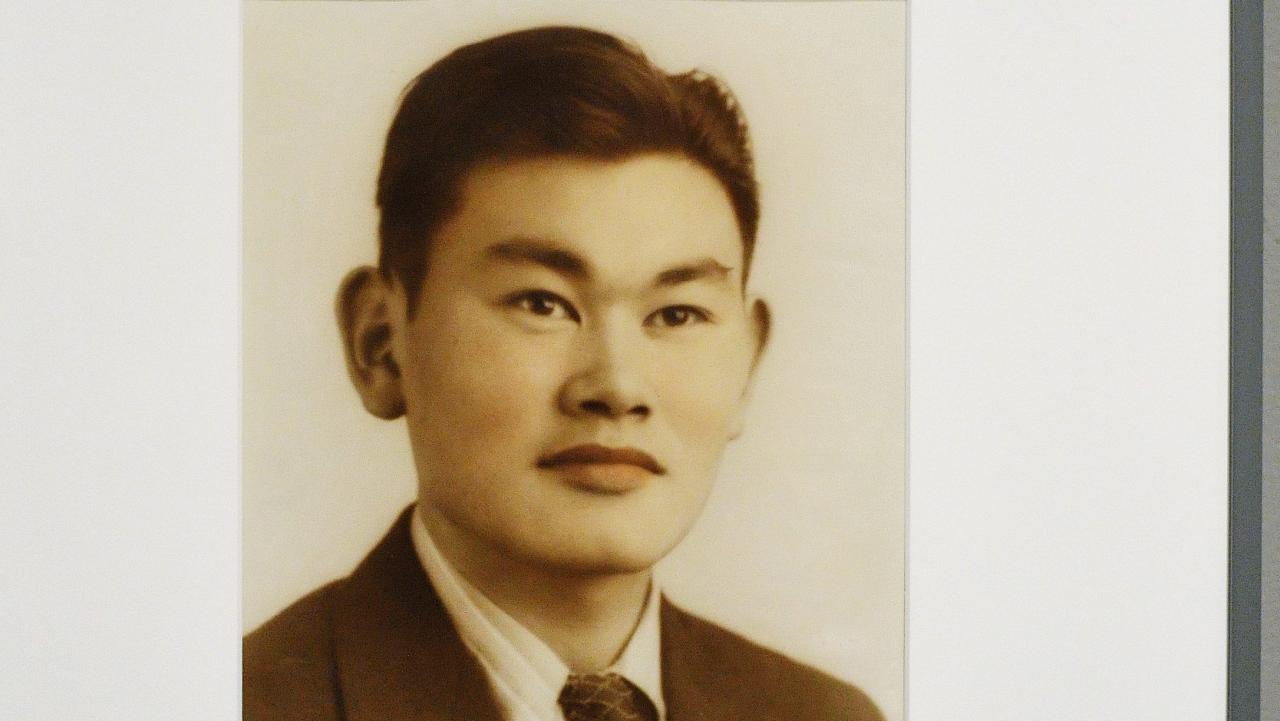
Korematsu v. United States was a landmark case in which the Supreme Court ruled that the detention of Japanese Americans during World War II was constitutional. The legal arguments presented by both sides in the case were complex and far-reaching.
The government argued that the detention was necessary to protect national security. They claimed that Japanese Americans were a threat to the country because they could potentially be spies or saboteurs. The government also argued that the detention was a reasonable way to prevent espionage and sabotage.
Korematsu and his supporters argued that the detention was unconstitutional. They claimed that it violated the Fifth Amendment’s Due Process Clause, which protects citizens from being deprived of life, liberty, or property without due process of law. They also argued that the detention violated the Equal Protection Clause, which prohibits the government from denying any person within its jurisdiction the equal protection of the laws.
Supreme Court’s Reasoning
The Supreme Court ruled in favor of the government, upholding the detention of Japanese Americans. The Court held that the detention was a “military necessity” and that the government had a legitimate interest in protecting national security. The Court also held that the detention was not a violation of the Due Process Clause or the Equal Protection Clause.
Dissenting Opinions
Two justices dissented from the majority opinion. Justice Frank Murphy wrote a powerful dissent in which he argued that the detention was a “legalization of racism.” Justice Robert Jackson also dissented, arguing that the detention was not a “military necessity” and that it violated the Due Process Clause.
The dissenting opinions in Korematsu v. United States have been cited in numerous subsequent cases as support for the argument that racial discrimination is unconstitutional. The case remains a landmark precedent in the area of civil rights law.
Impact and Legacy: Korematsu V. United States Answer Key
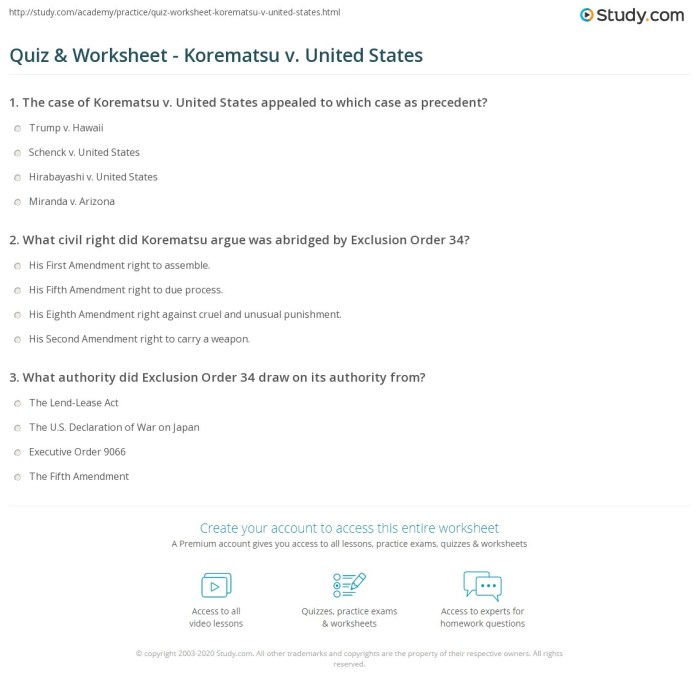
Korematsu v. United States had a profound and lasting impact on Japanese Americans and civil rights in the United States. The immediate impact was the internment of over 110,000 Japanese Americans during World War II, a violation of their constitutional rights.
The long-term impact included the erosion of trust between Japanese Americans and the government, the rise of the Asian American civil rights movement, and the eventual overturning of Korematsu’s conviction.
Subsequent Legal Challenges and Rulings
In the years following Korematsu’s conviction, several legal challenges were brought to overturn it. In 1983, a federal judge overturned Korematsu’s conviction, ruling that the government had failed to prove that military necessity justified the internment. The government appealed the ruling, but the Ninth Circuit Court of Appeals upheld the lower court’s decision in 1987. The Supreme Court declined to review the case, effectively ending the legal battle over Korematsu’s conviction.
Ongoing Debates and Controversies
Despite the overturning of Korematsu’s conviction, the case remains a subject of ongoing debate and controversy. Some argue that the internment was a necessary wartime measure, while others argue that it was a violation of civil rights. The case is often cited as an example of the dangers of racial profiling and the importance of protecting civil liberties during times of national crisis.
Historical Significance
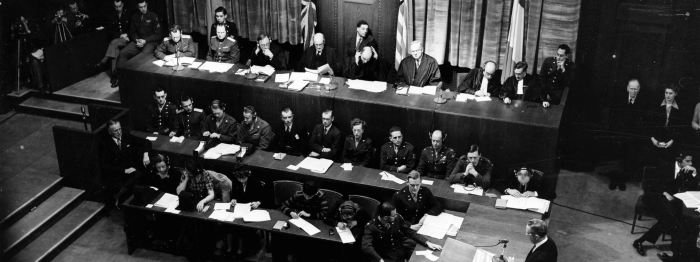
Korematsu v. United States holds immense historical significance as a landmark case that challenged the constitutionality of the internment of Japanese Americans during World War II. It brought to the forefront the complexities of civil rights and the delicate balance between national security and individual liberties.
The case’s relevance extends beyond its historical context, as it continues to resonate with contemporary issues of discrimination and national security. Korematsu v. United States serves as a poignant reminder of the dangers of prejudice and the importance of upholding constitutional principles even in times of crisis.
Civil Rights and Constitutional Law
Korematsu v. United States challenged the constitutionality of Executive Order 9066, which authorized the mass internment of Japanese Americans. The Supreme Court’s initial ruling in 1944 upheld the government’s actions, arguing that the order was a necessary measure for national security.
However, the case was later overturned in 1983, with the court acknowledging the racial discrimination and violation of civil liberties that had occurred.
Contemporary Relevance
The legacy of Korematsu v. United States continues to shape contemporary debates on discrimination and national security. The case highlights the potential for government overreach in the name of security and the importance of protecting individual rights even in times of crisis.
It also serves as a reminder of the need to challenge prejudice and uphold the principles of equality and justice for all.
Comparison with Other Cases
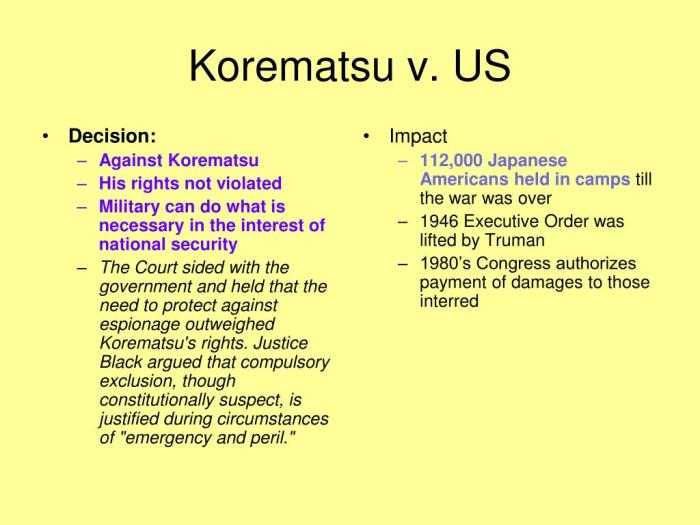
Korematsu v. United States is often compared to other landmark cases involving civil rights and constitutional law, such as Brown v. Board of Education(1954) and Loving v. Virginia(1967). These cases share several similarities, including their focus on the protection of individual rights against government overreach and their reliance on the Equal Protection Clause of the Fourteenth Amendment.
Brown v. Board of Education (1954)
In Brown v. Board of Education, the Supreme Court ruled that racial segregation in public schools was unconstitutional. This decision overturned the Court’s previous ruling in Plessy v. Ferguson(1896), which had established the “separate but equal” doctrine. Brown v. Board of Educationwas a major victory for the civil rights movement and helped to pave the way for the desegregation of public schools throughout the United States.
Korematsu v. United Statesand Brown v. Board of Educationare similar in that they both involved the Supreme Court overturning a previous ruling that had upheld government discrimination. In both cases, the Court found that the government’s actions violated the Equal Protection Clause of the Fourteenth Amendment. However, there are also some important differences between the two cases.
Brown v. Board of Educationwas a clear victory for the civil rights movement, while Korematsu v. United Stateswas a setback. Brown v. Board of Educationhelped to pave the way for the desegregation of public schools, while Korematsu v. United Statesupheld the government’s internment of Japanese Americans during World War II.
Loving v. Virginia (1967)
In Loving v. Virginia, the Supreme Court ruled that laws prohibiting interracial marriage were unconstitutional. This decision overturned the Court’s previous ruling in Pace v. Alabama(1883), which had upheld the constitutionality of such laws. Loving v. Virginiawas a major victory for the civil rights movement and helped to pave the way for the legalization of interracial marriage throughout the United States.
Korematsu v. United Statesand Loving v. Virginiaare similar in that they both involved the Supreme Court overturning a previous ruling that had upheld government discrimination. In both cases, the Court found that the government’s actions violated the Equal Protection Clause of the Fourteenth Amendment. However, there are also some important differences between the two cases.
Loving v. Virginiawas a clear victory for the civil rights movement, while Korematsu v. United Stateswas a setback. Loving v. Virginiahelped to pave the way for the legalization of interracial marriage, while Korematsu v. United Statesupheld the government’s internment of Japanese Americans during World War II.
Timeline of Events
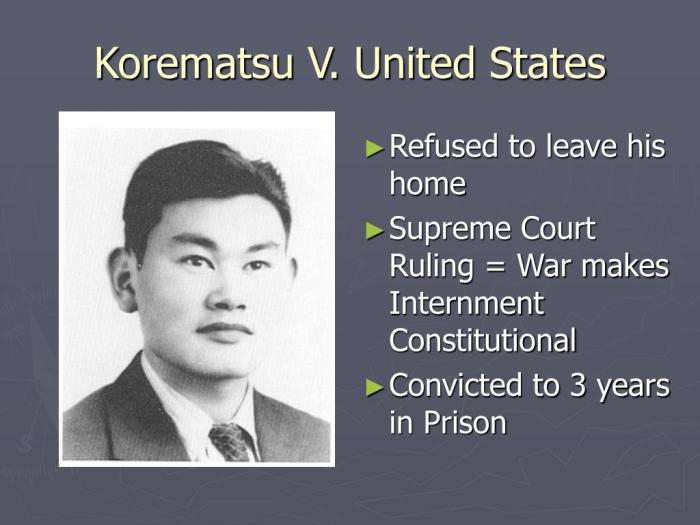
The following is a timeline of key events related to Korematsu v. United States:
February 19, 1942
- President Franklin D. Roosevelt signs Executive Order 9066, which authorizes the Secretary of War and the armed forces to remove people of Japanese ancestry from designated military areas.
March 27, 1942
- Fred Korematsu is arrested for violating Executive Order 9066.
May 18, 1942
- Korematsu is convicted of violating Executive Order 9066 and sentenced to five years in prison.
December 18, 1944
- The Supreme Court rules in Korematsu v. United States that the government’s detention of Japanese Americans during World War II was a “military necessity” and therefore constitutional.
November 10, 1983
- A federal judge overturns Korematsu’s conviction, ruling that the government had withheld evidence that would have exonerated him.
February 23, 1998
- President Bill Clinton awards the Presidential Medal of Freedom to Korematsu.
Table of Legal Arguments
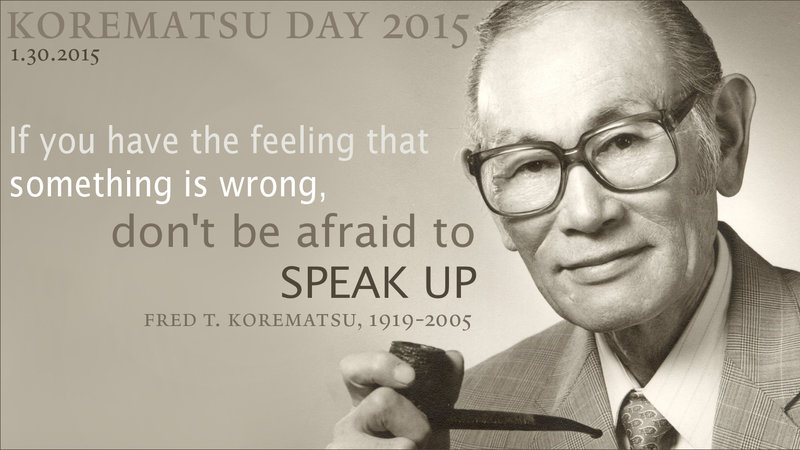
The legal arguments presented in Korematsu v. United States centered around the constitutionality of the government’s actions and the rights of American citizens.
The table below summarizes the arguments presented by both sides in the case, along with the Supreme Court’s rulings on each argument.
Plaintiff’s Arguments
- The government’s order to detain Japanese Americans was a violation of the Due Process Clause of the Fifth Amendment, which prohibits the government from depriving individuals of life, liberty, or property without due process of law.
- The order was also a violation of the Equal Protection Clause of the Fourteenth Amendment, which prohibits the government from denying any person within its jurisdiction the equal protection of the laws.
Government’s Arguments, Korematsu v. united states answer key
- The government’s order was a necessary measure to protect national security during wartime.
- The order was not based on race or ethnicity, but on military necessity.
Supreme Court’s Rulings
- The Supreme Court ruled that the government’s order was a “military necessity” and that the government had the authority to detain Japanese Americans during wartime.
- The Court also ruled that the order was not based on race or ethnicity, but on military necessity.
Question Bank
What was the significance of Korematsu v. United States?
Korematsu v. United States was a landmark Supreme Court case that upheld the government’s authority to detain Japanese Americans during World War II without due process. The decision had a profound impact on civil rights and constitutional law, raising questions about the balance between national security and individual liberties.
What were the legal arguments presented in Korematsu v. United States?
The plaintiff argued that the internment of Japanese Americans was a violation of the Fifth Amendment’s Due Process Clause. The government argued that the internment was a necessary wartime measure to protect national security.
What was the impact of Korematsu v. United States?
The decision in Korematsu v. United States had a devastating impact on Japanese Americans, who were forcibly removed from their homes and detained in internment camps. The decision also set a precedent for the government’s use of racial profiling and mass detention during times of national emergency.